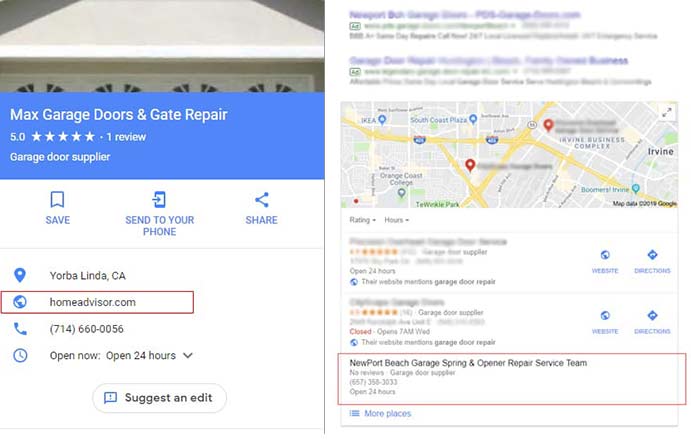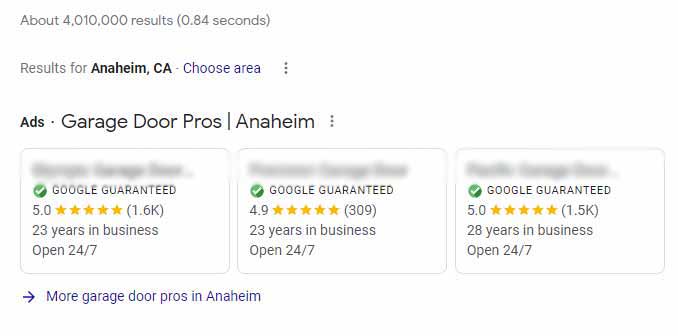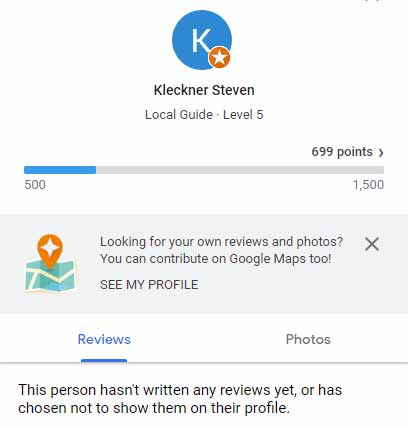As the internet has become an integral part of modern life, searching for reputable garage door repair companies in today’s online environment has never been more challenging. The hurdles users face include fake websites, false locations, and deceptive suppliers and dealers that aim to trick consumers into financial losses.
Millions of Americans fall victim to fraudulent businesses, fly-by-night companies, and call centers that use fake locations, outsourcing their business to gig workers who overcharge for questionable repair work. In the following sections, we offer a detailed analysis of this widespread problem and explore the reasons why homeowners must exercise caution when navigating the digital landscape for garage door repair services.
What Is Garage Door Repair Web Spam?
According to Wikipedia, search engine spam is defined as:
“Spamdexing (also known as search engine spam, search engine poisoning, black-hat Search engine optimization (SEO), search spam or web spam) is the deliberate manipulation of search engine indexes. It involves a number of methods to manipulate the relevance or prominence of resources indexed, in a manner inconsistent with the purpose of the indexing system.
Many search engines check for instances of spamdexing and will remove suspect pages from their indexes. Also, search-engine operators can quickly block the results-listing from entire websites that use spamdexing, perhaps alerted by user complaints of false matches.
These methods are more focused on breaking the search-engine-promotion rules and guidelines.”
If a garage door repair company is utilizing web spam as part of their marketing strategy, this is not usually a good sign. Typically, if a company resorts to unethical marketing techniques, there’s a significant chance that they may also use unethical practices when selling services and repairing garage doors.
Search engines, including Bing, Google, and others, are grappling to keep fake garage door businesses off their platforms, an issue that extends beyond this industry alone. These deceptive garage door repair listings are typically orchestrated by dubious entities, such as shady companies, failing contractors, call centers and lead generation companies, which often dispatch unlicensed and unqualified individuals.

In a post on WJLA.com, Bryan Seely shed light on the problem, explaining, “Scammers create a fake business name and address, but list a real phone number. They walk through a few easy steps on search engines to get the ‘business’ listed, and voila! A few days later, that fake business is getting very real calls from unwitting consumers.”
Reporting Fraudulent Garage Door Repair Listings
Although tech giants like Bing and Google aren’t cooperative and consistently fail to prevent this practice, there is a process you can follow to report and remove fake garage door repair listings or any other fraudulent pages listed on their Maps platform.
- To report fraudulent listings on Bing, follow this process.
- To report fraudulent listings on Google, follow this process.
If you use social media, you can take screenshots of fake companies on Google Maps and use the picture post it with the hashtag #StopCrapOnTheMap in order to get more exposure.
The Google Guaranteed Platform Consumers May Want to Avoid
The Google Guaranteed platform, allegedly ‘backed by the Google Guarantee,’ is intended to ensure that only legitimate companies are listed. However, the company’s ‘badge of trust’ hides an ugly reality. The platform enables garage door repair companies to deceive users by getting listed multiple times under different names and phone numbers. This deceptive practice, which was formerly used by the worst garage door repair company in the US, is ironically widespread on the Google Guaranteed platform.
Additionally, Google Guaranteed isn’t designed to prioritize ads from garage door repair companies and businesses located near the users. More often than not, the platform will display higher on the list ads paid by companies that are located dozens, if not hundreds, of miles away from the user’s location.

The Google Guaranteed service is also experiencing a troubling trend as the platform is consistently swamped with thousands of fake reviews while the company is unwilling to address the situation.
Fake Reviews on Google Guaranteed and Maps
Deceptive marketing techniques, such as the creation of fake Map listings, represent just one method by which search results can be manipulated to mislead users.

Another strategy involves intentionally posting fake reviews, influencing the search engine results pages (SERPs) to favor specific listings over others. The objective of this manipulation is to improve visibility, drive traffic, and ultimately boost revenue.
How to Identify Fake Google Reviews
Identifying fraudulent reviews on garage door repair listings and on the internet, in general, can be challenging, but there are some common signs you can look for to help you identify these potentially deceptive reviews.
- Reviews are all over the map: If the review history isn’t hidden, fake accounts are usually used to review businesses in multiple states or regions that aren’t consistent with the business’s actual location. For instance, a fraudulent account may have posted a fake 5-star review for a garage door repair company in Orange County, a locksmith in New York, and a carpet cleaner in Florida.
- Excessive number of reviews: An unusually high number of 5-star reviews posted within a short time period.
In general, if something seems too good to be true, it probably is. Stay vigilant and stay away from garage door repair companies that buy fake reviews.
How to Find a Reputable Garage Door Company When Searching Online
First, always bear in mind that companies and businesses listed on the aforementioned search engines and platforms are not regulated. As long as US regulators will not amend Section 230 and big tech remain unwilling to make changes, fake garage door repair companies will be able to continue deceiving unsuspecting homeowners in Orange County and nationwide.
Always remember that companies and businesses listed on the mentioned search engines and platforms are not regulated. As long as US regulators do not amend Section 230 and big tech remains unwilling to make changes, fake garage door repair companies will continue to deceive unsuspecting homeowners in Orange County and nationwide.
Garage Door Repair Ads
Online ads could be placed by lead generation companies and call centers attempting to collect user information for outsourcing. This article explains how the Google Ads algorithm works. Using the location targeting feature, advertisers can target the user’s location regardless of their own.
For instance, a garage door repair company can purchase ads in Fountain Valley, CA, even if they are based in the Bay Area or San Diego. By outsourcing the user information to a gig worker or subcontractor in the user’s area, they are able to provide the service.
Lead Generation Service
Lead generation is the process of identifying and cultivating potential customers, known as “leads,” for a business’s products or services. A company that specializes in generating leads works to find new customers for their clients. For instance, if a garage door repair contractor hires the services of a lead generation company, this lead generation company would look for ways to find new customers and generate new leads for the contractor.
These companies might utilize ethical marketing techniques, but more often than not, their techniques involve search engine spam, using data illegally, and creating fake listings on Bing, Apple and Google Maps to boost business and maximize profit. HomeAdvisor, Angie’s List, and Thumbtack are only few examples of lead generation companies.
Many lead generation companies outsource their work, which comes with a whole host of problems. For instance, when companies outsource their leads, it usually causes issues with communication, collaboration, and skill levels. It can also be deceitful and confusing for customers who are trying to understand the organizational structure of the company or garage door repair provider they are dealing with.
Organic Search
Instead of relying on paid online ads and Bing and Google Maps platforms, you may want to prioritize local organic search results. These results are displayed to the user below the paid ads and map listings. The most relevant results are likely to appear when users search for something like “garage door repair” + the desired city. For instance, a Costa Mesa resident would benefit from searching for “garage door repair in Costa Mesa” or “garage door repair near me” with the device location service active.
The organic results on the first page mostly feature reputable garage door repair companies that have invested time and effort in building their brand and reputation. Nevertheless, exceptions exist for every rule, so users should exercise common sense and verify the company’s contractor license and address on the CSLB website or any official source relevant to their area or location.
Be cautious when visiting poorly designed or unprofessional websites, as they often indicate that the website may be fake. Furthermore, garage door repair coupons, installation discounts, and offers that appear too good to be true are often scams and bait-and-switch garage door repair practices designed to lure potential customers and trick them into purchasing services and products they don’t actually need.








I was unaware that lead-generating companies outsource the work needed for a garage door repair. My garage regularly struggles to both open and close. I think that I will get into contact with a repair company in the future after doing research.